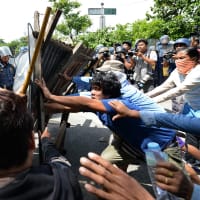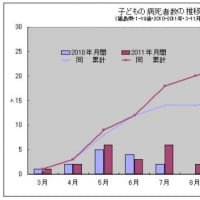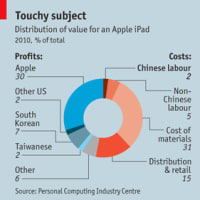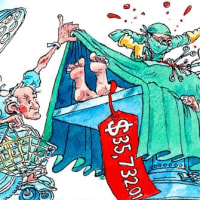ライブドアの時には、株価がいつも話題になっていました。
あの頃はブームで、主婦やらまでが株を貸ってたりして。
株価が下がると儲かるスキームを組んで、外資系の株屋さんがオーナーから株を株を借りて売りまくって、ドンでも無いとかかんとか、まあ、一般投資家食いものスキームみたいなのが大手を振って歩いてるって印象だったんですな。
で、ニューヨークタイムズに韓国のこんな記事がでてまして、
In Korea, the Game of Trading Has Rules
If the players are caught, the scheme is usually deemed too complicated and wrongdoing too hard to prove to justify any more than a civil case. That ends in a fine — sometimes a large one — but perhaps one that may be seen as a cost of doing business.
In South Korea, they seem to be adopting a different attitude.
This week prosecutors in Seoul announced indictments on market manipulation charges of a Korean affiliate of Deutsche Bank and of four Deutsche Bank employees who were blamed for intentionally causing a sudden collapse in Korean stock prices last November.
In a separate case in June, two former Credit Suisse employees were indicted by Korean prosecutors on charges of manipulating stock prices. The bank itself was not charged with a crime.
市場を操作して不正に利益を得る、という場合、取り締まったとしても中々刑務所にぶち込むというとこまではゆかず、せいぜい罰金までか、というところを、韓国当局が、今週、ドイツ銀行の現地法人の4人の従業員を刑事告発をしたというんですな。
6月にはクレディスイスの従業員が動揺に告発されているとか。
告発によれば、
Here’s what prosecutors claim took place. The Deutsche Bank traders established a huge index-arbitrage position, and placed a huge side bet on prices falling. Then they closed out the arbitrage position in a way designed to cause prices to collapse. They cleaned up.
ドイツ銀行は、どでかいインデックスアービトレイジポジション作りながら、同時に価格が下がる方向に掛けた。で、アービトレイジポジションを価格が崩落するようなやり方でクローズさせた。
In the more formal language that Korean market regulators used in their report, the traders “constructed speculative derivatives positions in advance through the combination of short synthetic futures and long put options.” Then in the final 10 minutes of trading on Nov. 11, they sold $2.2 billion worth of stocks, selling every stock in the Kospi 200 index, which includes all major Korean stocks.
告発状には、シンセティックフューチャーの売りと、売りオプションの買いを組み合わせた投機的なデリバティブポジションを事前に組んでおいて、11月11日の市場終了10分前に、22憶ドル相当の株を売りまくった。
That selling had a huge impact. The Kospi 200 index fell 2.8 percent in those 10 minutes, providing $40.5 million in what the Koreans called “illegal profits” on the derivatives position, which settled based on the closing prices.
その売りは効果てきめんで、Kopsi200インデックスはその10分間で2.8%も下落。彼らは4千50万ドルもの不正利益を得た。
Deutsche owned stock, and was short index futures — or a synthetic equivalent. At the end of trading on Nov. 11, the price of the futures would be determined by closing prices of the shares. So if it sold the stock at closing prices, it would get the small profit it presumably locked in when it established the arbitrage positions.
ドイツ銀行は株をもっていて、同時に売りのショートインデックスフューチャーも持っていた。11月11日の市場の終値でフューチャーは値が決まるので、その値段で持っている株を売れば、彼らは少しだが利益がでるような仕組みになっている。
But Deutsche then went ahead and also bought more index put options. Those puts would soar in value as prices plunged. That is where it presumably made most if not all of the $40.5 million.
しかし、ドイツ銀行はさらに、インデックス売りオプションも買い、そのオプションは株価が落ちると儲かる。もうかったほとんどはこの仕掛けから得ている。
まあ、この記事だけではよくわからないし、株の売り買いのしかけも知らないんですが、こういうことでしょうか。
1.終値の価格に連動する先物の売り予約を持っている
2.本来は、その予約を使って、持ち株をそれで売って、少しだけ利益が出る価格に設定されているわけだが(金利分でしょう)、
3.ドイツ銀行は持ち株をクローズ前に売って、しかも大量に売ったんで市場が下げた。
4.ドイツ銀行は先物売り予約を実行しなければならないが持ち株は売ってしまっている
5.だから、終値で現物を買って売り予約を実行、清算。
だとすると、これはタイミングが難しいんですな。
先に現物を売るわけですが、売り時は、持ち株の買値より高くないと損が出るんで売りにくいし、先物の清算を考えると先物予約値より終値が高いと損が出てしまう。高くてもだめ、低くてもだめ。
しかし、良く考えると、株価が上がっていた場合、現物売却の時に利益が出た分を、予約消化で損になるわけで、結局相殺。市場が動かなければ、のハナシですが。
もし、市場が動いて、現物売却時点よりも、終値が下がっていれば、この差額は儲けになりますな。
ってことで、されば、戦略としては、現物を高く売って、先物を安い時にクローズできればいいわけで、それを実行するために、
クローズ直前に大量売却することで市場にインパクトを与えて、この差額が儲かるという算段ですかね。よく考えましたなあ。
クローズ直前でないと、他の要因で値が戻してしまうので、とにかく、直前にやってしまえばリスクはほとんどないわけですな。いやすごい、ってかエライ簡単な商売でんな。
さらに儲けるために大量のオプションも絡めようっていうんで、なんてフテエ野郎どもで。
It is worth noting how skinny the profits were — 1.8 percent of the money involved. For anyone who had to put up margins and borrow money at normal rates, the profits would have been smaller, if there were any at all. But financial firms can borrow cheap and largely avoid margins because their positions are offsetting.
かかった資金総額からしたら利益幅は小さいとのことです。
ただ、この金余りで、安く資金が手にはいるんで、こういう大掛かりな仕掛けができるんですな。一般の中小事業会社には中々資金が回らないわけですが、金融セクターには資金が余っているってことですかね。
この記事では、米国ではこういうスキームはこれまで見逃されてきた、というか、市場内で読み合うことで、こういうスキームで利益がでないように発展してきたというようなことが書いてありますが、
ボルカールールで、今後はこういうこともできなくなるし、韓国や他の国もこういう不正な奴らをきちんと国外追放して始末して、本来金融機関が担うべき資源の効率配分という機能にもどるべきだ、云々。
まあ、投機取引事態を取り締まれば良い、とかいう意見は政策的な合意が得られないにしても、銀行が自身でやるべきか、というのはちょいと別のハナシで、しかも大量の資金を自身の信用力で調達して市場を荒らすというのは、ヤッパまずいですよね。
日本は、どうなんですかな。
あの頃はブームで、主婦やらまでが株を貸ってたりして。
株価が下がると儲かるスキームを組んで、外資系の株屋さんがオーナーから株を株を借りて売りまくって、ドンでも無いとかかんとか、まあ、一般投資家食いものスキームみたいなのが大手を振って歩いてるって印象だったんですな。
で、ニューヨークタイムズに韓国のこんな記事がでてまして、
In Korea, the Game of Trading Has Rules
If the players are caught, the scheme is usually deemed too complicated and wrongdoing too hard to prove to justify any more than a civil case. That ends in a fine — sometimes a large one — but perhaps one that may be seen as a cost of doing business.
In South Korea, they seem to be adopting a different attitude.
This week prosecutors in Seoul announced indictments on market manipulation charges of a Korean affiliate of Deutsche Bank and of four Deutsche Bank employees who were blamed for intentionally causing a sudden collapse in Korean stock prices last November.
In a separate case in June, two former Credit Suisse employees were indicted by Korean prosecutors on charges of manipulating stock prices. The bank itself was not charged with a crime.
市場を操作して不正に利益を得る、という場合、取り締まったとしても中々刑務所にぶち込むというとこまではゆかず、せいぜい罰金までか、というところを、韓国当局が、今週、ドイツ銀行の現地法人の4人の従業員を刑事告発をしたというんですな。
6月にはクレディスイスの従業員が動揺に告発されているとか。
告発によれば、
Here’s what prosecutors claim took place. The Deutsche Bank traders established a huge index-arbitrage position, and placed a huge side bet on prices falling. Then they closed out the arbitrage position in a way designed to cause prices to collapse. They cleaned up.
ドイツ銀行は、どでかいインデックスアービトレイジポジション作りながら、同時に価格が下がる方向に掛けた。で、アービトレイジポジションを価格が崩落するようなやり方でクローズさせた。
In the more formal language that Korean market regulators used in their report, the traders “constructed speculative derivatives positions in advance through the combination of short synthetic futures and long put options.” Then in the final 10 minutes of trading on Nov. 11, they sold $2.2 billion worth of stocks, selling every stock in the Kospi 200 index, which includes all major Korean stocks.
告発状には、シンセティックフューチャーの売りと、売りオプションの買いを組み合わせた投機的なデリバティブポジションを事前に組んでおいて、11月11日の市場終了10分前に、22憶ドル相当の株を売りまくった。
That selling had a huge impact. The Kospi 200 index fell 2.8 percent in those 10 minutes, providing $40.5 million in what the Koreans called “illegal profits” on the derivatives position, which settled based on the closing prices.
その売りは効果てきめんで、Kopsi200インデックスはその10分間で2.8%も下落。彼らは4千50万ドルもの不正利益を得た。
Deutsche owned stock, and was short index futures — or a synthetic equivalent. At the end of trading on Nov. 11, the price of the futures would be determined by closing prices of the shares. So if it sold the stock at closing prices, it would get the small profit it presumably locked in when it established the arbitrage positions.
ドイツ銀行は株をもっていて、同時に売りのショートインデックスフューチャーも持っていた。11月11日の市場の終値でフューチャーは値が決まるので、その値段で持っている株を売れば、彼らは少しだが利益がでるような仕組みになっている。
But Deutsche then went ahead and also bought more index put options. Those puts would soar in value as prices plunged. That is where it presumably made most if not all of the $40.5 million.
しかし、ドイツ銀行はさらに、インデックス売りオプションも買い、そのオプションは株価が落ちると儲かる。もうかったほとんどはこの仕掛けから得ている。
まあ、この記事だけではよくわからないし、株の売り買いのしかけも知らないんですが、こういうことでしょうか。
1.終値の価格に連動する先物の売り予約を持っている
2.本来は、その予約を使って、持ち株をそれで売って、少しだけ利益が出る価格に設定されているわけだが(金利分でしょう)、
3.ドイツ銀行は持ち株をクローズ前に売って、しかも大量に売ったんで市場が下げた。
4.ドイツ銀行は先物売り予約を実行しなければならないが持ち株は売ってしまっている
5.だから、終値で現物を買って売り予約を実行、清算。
だとすると、これはタイミングが難しいんですな。
先に現物を売るわけですが、売り時は、持ち株の買値より高くないと損が出るんで売りにくいし、先物の清算を考えると先物予約値より終値が高いと損が出てしまう。高くてもだめ、低くてもだめ。
しかし、良く考えると、株価が上がっていた場合、現物売却の時に利益が出た分を、予約消化で損になるわけで、結局相殺。市場が動かなければ、のハナシですが。
もし、市場が動いて、現物売却時点よりも、終値が下がっていれば、この差額は儲けになりますな。
ってことで、されば、戦略としては、現物を高く売って、先物を安い時にクローズできればいいわけで、それを実行するために、
クローズ直前に大量売却することで市場にインパクトを与えて、この差額が儲かるという算段ですかね。よく考えましたなあ。
クローズ直前でないと、他の要因で値が戻してしまうので、とにかく、直前にやってしまえばリスクはほとんどないわけですな。いやすごい、ってかエライ簡単な商売でんな。
さらに儲けるために大量のオプションも絡めようっていうんで、なんてフテエ野郎どもで。
It is worth noting how skinny the profits were — 1.8 percent of the money involved. For anyone who had to put up margins and borrow money at normal rates, the profits would have been smaller, if there were any at all. But financial firms can borrow cheap and largely avoid margins because their positions are offsetting.
かかった資金総額からしたら利益幅は小さいとのことです。
ただ、この金余りで、安く資金が手にはいるんで、こういう大掛かりな仕掛けができるんですな。一般の中小事業会社には中々資金が回らないわけですが、金融セクターには資金が余っているってことですかね。
この記事では、米国ではこういうスキームはこれまで見逃されてきた、というか、市場内で読み合うことで、こういうスキームで利益がでないように発展してきたというようなことが書いてありますが、
ボルカールールで、今後はこういうこともできなくなるし、韓国や他の国もこういう不正な奴らをきちんと国外追放して始末して、本来金融機関が担うべき資源の効率配分という機能にもどるべきだ、云々。
まあ、投機取引事態を取り締まれば良い、とかいう意見は政策的な合意が得られないにしても、銀行が自身でやるべきか、というのはちょいと別のハナシで、しかも大量の資金を自身の信用力で調達して市場を荒らすというのは、ヤッパまずいですよね。
日本は、どうなんですかな。




















※コメント投稿者のブログIDはブログ作成者のみに通知されます